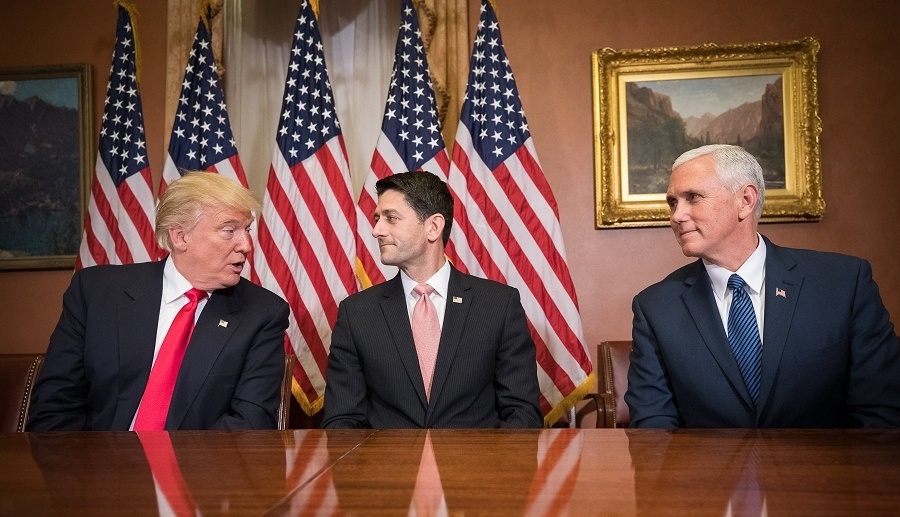National
Senate GOP musters final push to erase Obama health care law

Nonpartisan CBO won’t have estimates ready in
time for vote that impacts one-sixth of economy
WASHINGTON — Senate Republicans expressed growing hope Monday for a final push to scuttle President Barack Obama’s health care law, an effort that still faces an uphill climb and just a two-week window to pass. Adding more risk, senators would be in the dark about the bill’s impact on Americans, since the Congressional Budget Office says crucial estimates won’t be ready in time for a vote.
Robert Reich, former Sec. of Labor, who is currently the Chancellor’s Professor of Public Policy at the University of California-Berkeley, points out that the plan would:
- Cause at least 32 million Americans to lose health coverage. That’s according to the Congressional Budget Office’s analysis of a similar proposal. This time around Senate Republicans want to rush a vote before the CBO can complete its review.
- Eliminate protections for Americans with pre-existing conditions. The bill would allow states to scale back essential health benefits and carve out exceptions for insurers to discriminate against sick patients.
- Increase premiums next year by an estimated 20 percent. By nixing the Affordable Care Act’s requirement that everyone sign up for coverage, fewer healthy people will enroll and costs will increase.
- Gut funding for Medicaid by $300 billion, including draconian cuts to programs that provide care for seniors, children, and people with disabilities.
- End funding for Planned Parenthood.
With no CBO score, Sen. Bernie Sanders said, “Given this reality, and the lack of knowledge that Senators will have about the impact this legislation will have on one-sixth of the American economy, it would be beyond comprehension for the Republicans to proceed with this bill until we have that information.”
Democrats backed by doctors, hospitals, and patients’ groups mustered an all-out effort to finally smother the GOP drive, warning of millions losing coverage and others facing skimpier policies. Senate Minority Leader Chuck Schumer went further, saying the partisan measure threatened the spirit of cooperation between President Donald Trump and Democratic leaders embodied in a recent budget deal and progress on immigration.
Minnesota Sen. Al Franken wrote, “The new proposal would roll back nationwide protections for people with pre-existing conditions and make health care coverage unobtainable for many Americans. And on top of that, it would profoundly change how Medicaid works — breaking the federal government’s promise to fund a program that serves as a lifeline to seniors, working families, children, and people with disabilities. But that’s not all. It scraps important consumer protections, opening the door for insurers to impose lifetime and annual limits and charge older folks more money for coverage.
“This proposal not only makes it harder for states to deliver care, it actually punishes states that expanded Medicaid and have proactively enrolled people in coverage—states like Minnesota.
This bill would be a disaster for Minnesotans and the American people.”
In defiance of the vast majority of Americans, Senate Republicans are trying yet again to rip health care away from millions of Americans. This effort, led by Republican Senators Lindsey Graham and Bill Cassidy, is quickly gaining steam, and it’s time to raise your voices in response. The new proposal would roll back nationwide protections for people with pre-existing conditions and make health care coverage unobtainable for many Americans. And on top of that, it would profoundly change how Medicaid works—breaking the federal government’s promise to fund a program that serves as a lifeline to seniors, working families, children, and people with disabilities. But that’s not all. It scraps important consumer protections, opening the door for insurers to impose lifetime and annual limits and charge older folks more money for coverage. This proposal not only makes it harder for states to deliver care, it actually punishes states that expanded Medicaid and have proactively enrolled people in coverage—states like Minnesota. Nationally, this proposal would cut federal funding for coverage programs by $80 billion in 2026, and by $300 billion in 2027, wreaking havoc on Minnesota’s budget and state budgets across the country. This bill would be a disaster for Minnesotans and the American people. As a member of the Senate Health Committee, I’m going to fight this, and I call on my colleagues to continue the bipartisan work we’ve started to help bring down health insurance premiums, stabilize the individual market, and lower health care costs for all people. Let’s keep moving forward by putting people over politics and making sure that Minnesotans—and Americans across the country—have access to affordable, high quality health care. This is what Minnesotans want and what the American people deserve.
Posted by U.S. Senator Al Franken on Monday, September 18, 2017
“After two weeks of thinking bipartisanship, that flickering candle, might gain some new light, this is the last thing we need,” Schumer, D-N.Y., said on the Senate floor.
Two months after one of the GOP’s top priorities crashed on the Senate floor, the revived attempt to uproot Obama’s law is being led by GOP Sens. Lindsey Graham of South Carolina and Louisiana’s Bill Cassidy.
Vice President Mike Pence was calling senators to seek support, White House officials said. And looking to add momentum, House Speaker Paul Ryan, R-Wis., said the House would vote on the bill if it passes the Senate. Speaking in Menomonee Falls, Wisconsin, Ryan called it “our best, last chance to get repeal and replace done.”
The 140-page bill would replace much of Obama’s statute with block grants to states and give them wide leeway on spending the money. It would let states ease coverage requirements under that 2010 law, end Obama’s mandates that most Americans buy insurance and that companies offer coverage to workers, and cut and reshape Medicaid.
A victory would let Trump and Republican leaders claim redemption on their “repeal and replace” effort. While the House approved its version of the bill in May, the drive collapsed when the GOP-led Senate defeated three proposals for scrapping Obama’s 2010 overhaul in July.
“He’s the grave robber,” No. 3 Senate GOP leader John Thune of South Dakota said of Cassidy. “This thing was six feet under.”
Still, Thune cautioned that leaders needed votes from 50 of the 52 GOP senators to win.
Senate leaders have no desire to lose yet another health care vote. After July’s embarrassing Senate setback, Majority Leader Mitch McConnell, R-Ky., said he’d not revisit it unless he was assured he had the votes to succeed, and many Republicans began refocusing on another big GOP priority, a tax overhaul.
Now, Graham and Cassidy say they believe they are close to the votes they’d need, prompting GOP leaders to check if they can finally succeed.
The sponsors say their proposal would let states decide what health care programs work best for their residents. Opponents say patients would suffer.
The GOP proposal “would weaken access to the care Americans need and deserve,” said a statement from 16 patients groups including the American Heart Association and the March of Dimes. The American College of Physicians and the Children’s Hospital Association also oppose it.
Looking to solidify GOP support, the bill would reduce spending gaps between states that expanded Medicaid under Obama’s law and the mostly GOP states that did not. Details on the measure’s exact state-by-state impact were murky.
In a tweet, the Congressional Budget Office said it would have preliminary estimates of the bill’s fiscal impact next week. But it said it would be unable to provide projections of the measure’s effect on coverage, premiums and overall federal deficits “for at least several weeks.”
That timing is crucial because Republicans controlling the Senate 52-48 have only Sept. 30 to succeed with just 50 votes. Pence would cast the tie-breaking vote, and White House officials say Trump would sign it.
Special procedures preventing Democrats from using a filibuster to kill the measure expire after Sept. 30, after which Republicans would need 60 votes to win. They can’t reach that number because Democrats unanimously oppose the GOP effort.
The budget agency’s evaluations of past GOP repeal plans concluded they would have caused millions of Americans to lose insurance coverage. Some Republican senators are nervous about the measure’s impact on their own states, and the lack of CBO projections won’t help allay their concerns.
Conservative Sen. Rand Paul, R-Ky., has said he’ll oppose the measure because it doesn’t do enough to erase Obama’s law. Sen. Susan Collins, R-Maine, said she was concerned the bill would make “fundamental changes” in Medicaid.
Other Republicans who’ve not yet lined up behind the bill include Alaska’s Lisa Murkowski, Shelley Moore Capito of West Virginia, John McCain of Arizona and Ohio’s Rob Portman.
Collins, Murkowski and McCain provided the decisive votes against the last measure Republicans tried pushing through the Senate in July, which failed 51-49.
“It’s better but it’s not what the Senate is supposed to be doing,” McCain told reporters about the new package.
Arizona GOP Gov. Doug Ducey said he backed the new bill, putting pressure on McCain.
The revived drive comes as Sens. Lamar Alexander, R-Tenn., and Patty Murray, D-Wash., work toward a bipartisan deal to continue federal subsidies to insurers easing some costs for lower-earning customers that Trump has threatened to block.
Murray spokeswoman Helen Hare said Murray is “hopeful and optimistic” a deal could come soon, a statement that came as Democrats tried peeling away GOP support from the Graham-Cassidy bill.







